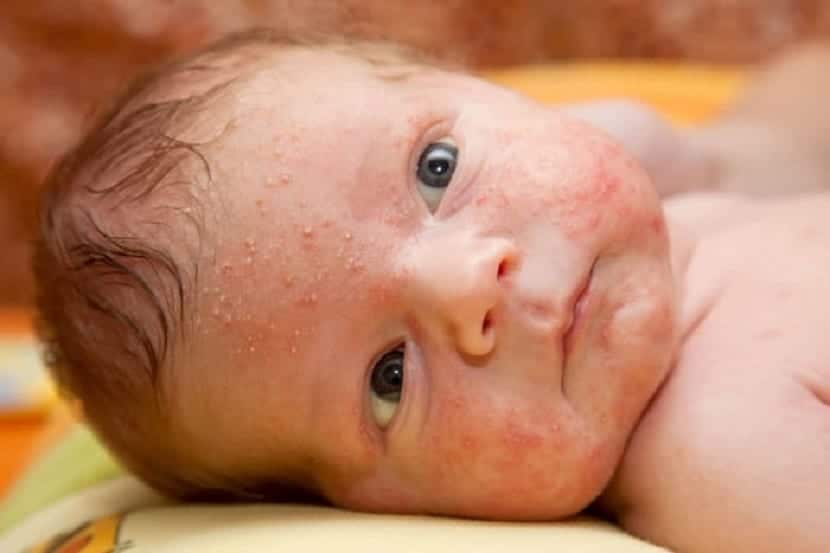
Babies' skin is extremely delicate and it is very frequent that it soles present various problems. Many of them disappear as the little one grows, but it is important to know them in order to treat them in the most appropriate way. The pediatrician will be the one who determines what is the problem that your baby has in the skin, since although the symptoms may be similar, both the causes and the treatment are completely different.
Therefore, it is essential not to proceed in any way without first having the baby checked by the specialist. In many cases, treatment is not necessary and it is enough to follow some recommendations. Let's see what are the most frequent problems on the skin of babies. In this way you can better recognize the symptoms and be alert to any changes.
Atopic dermatitis

More and more babies are suffering from atopic skin, a skin problem for which the exact cause is unknown. Atopic dermatitis differs from other skin problems because it manifests itself in the form of eczema, this produces redness, rash, peeling and above all, a lot of itching and discomfort to the child.
Atopic dermatitis usually appears in the first months of life and requires very specific care for the skin of children. At home you should avoid the use of perfumed detergents and wash your clothes with neutral and specific products for delicate skin. It is also important that the bath products are specific and that they hydrate the child's skin very well.
It is important to see your pediatrician, since atopic dermatitis occurs in the form of flare-ups. When this occurs, it is virtually impossible to control the problem and the use of drugs that the doctor must prescribe is necessary.
Infant acne
In the first weeks of life, some pimples with a white head may appear, very similar to those produced by juvenile acne. This acne is caused by the influence of maternal hormones that are transferred to the placenta during pregnancy. The pimples will disappear naturally and no treatment is necessary. However, it is important to follow good hygiene habits and not touch the pimples directly so as not to infect them.
Cradle cap

Seborrheic dermatitis, or cradle cap, is a very common skin problem in nursing babies. It usually appears due to excess sebum and it is differentiated by the appearance of yellowish scales on the baby's skull. Cradle cap usually disappears naturally and does not require medical treatment. At home you can comb your baby's head with a specific brush to help remove scales.
Home care
Before ruling out any possibility, it is very important that you go to the pediatrician to assess the problem in your baby's skin. Although in principle none of the problems mentioned are usually serious, the reality is that they are annoying for the little one and it is recommended that they are controlled. Especially being so small and that everything can get worse unexpectedly.
Although in most cases it is not possible to prevent these skin problems from appearing, you can follow some recommendations to improve the child's condition. These are some tips that you can follow at home:
- Keep your little one's nails always well cut and filed, this way you will avoid hurting himself as he will constantly try to scratch
- Use unscented soaps and lotions or chemical products, it is best to use those products that are recommended for babies with delicate skin
- Demand wash baby's clothes separately, with a neutral detergent and without using any type of fabric softener
- Keep your baby's skin always very well hydrated, especially if you have atopic dermatitis
- Anyone who is going to touch the baby, including yourself, should have extremely clean hands. Although it seems obvious, it is essential to avoid possible infections and also make your occasional skin problem worse